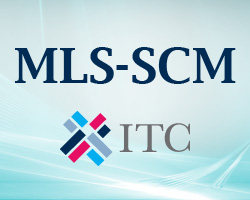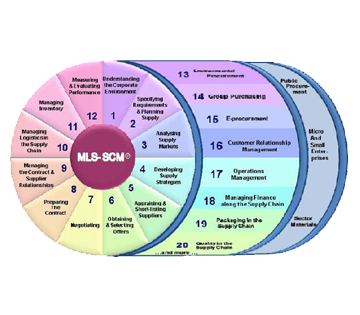

MLS-SCM is a practical, continuously updated and supported training pack that can help you to make effective
international purchasing and supply chain management become a key factor for your company’s competitiveness
and success.The programme is currently offered by 135 institutions in over 50 countries. More than 1000
trainers attached to these institutions are involved in teaching the programme and more than 25,000
professionals have benefited from this training since the programme started in 2001.
MLS-SCM consists of 20 modules of training, each two days in length which cover the whole supply chain from need to
procure to pay. It includes sustainability and quality. There are three certificates that are awarded on completion of
the online examinations. International Certificate in Supply Chain Management, Advanced International Certificate in
Supply Chain Management and Diploma in Supply Chain Management.
Watch Video

MODULE 1: UNDERSTANDING THE CORPORATE ENVIRONMENT
This Module aims to explain the impact of the corporate environment on the purchasing and supply function of an enterprise, and to show how this function interrelates with the rest of the organization. This Module explores which factors are parts of the corporate environment, and how these influence and interrelate with the purchasing and supply function.
MODULE 2: SPECIFYING REQUIREMENTS & PLANNING SUPPLY
This Module covers how to determine and specify all the different dimensions of what the enterprise needs to purchase. It gives practical guidance and advice on developing purchase specifications and planning supply in an enterprise. It also explains the role of the purchasing and the supply function and shows how its involvement in the specification and supply planning process varies depending of the type and importance of the purchase to be made.
MODULE 3: ANALYSING SUPPLY MARKETS
This Module describes a methodology and various practical tools that will enable the learner to analyze the supply markets in a cost-effective manner. It shows how to set priorities for supply market analysis taking account of the company’s situation. How supply markets function and their characteristics are also covered, and guidance is provided through a process of appraising the risks and opportunities of specific market segments.
MODULE 4: DEVELOPING SUPPLY STRATEGIES
This Module focuses on how to develop supply strategies for the company’s different categories of products and services. Developing and using different supply strategies for different types of purchases that will help you to spend your time and effort where it is most needed, and achieve the best results. This Module will show when – and for which types of purchases – to develop a strategic partnership with supplier(s) and when it is better to spot buy or have a framework contract. This Module also covers approaches such as joint ventures and internal provision.
MODULE 5: APPRAISING & SHORT-LISTING SUPPLIERS
This focuses on how to appraise suppliers for purposes of short-listing them as viable business partners for a company. Working with the best possible suppliers is essential for any enterprise, particularly when purchasing items that are critical to its operations, or involve a high degree of supply risk or of expenditure. Knowing how to identify such suppliers – and to assess their relative capabilities and degrees of motivation to do business with a company – will establish a firm foundation to develop productive supplier relationships over the long term. This Module covers issues relating to the kinds of criteria that can be used for supplier appraisal and how to locate, screen and further research suppliers that are likely to be the most appropriate. This Module also shows a methodology for measuring and rating potential suppliers against criteria that has already been set, including their financial situation. Learners will also understand key follow-up issues to take into account once this has already been completed the short-listing of suppliers.
MODULE 6: OBTAINING & SELECTING OFFERS
This Module will show learners how to best obtain and select offers from suppliers, which is one of the most important dimensions of purchasing. It covers issues such as how many suppliers to invite to offer depending on the type of purchase. It also deals with what type of process to apply in different situations and how formal this process needs to be (e.g., formal tendering as opposed to requesting quotations). The art of evaluating the offers you receive is also explained, and two separate Annexes deal specifically with the formal tendering process in more detail.
INTERNATIONAL ADVANCED CERTIFICATE IN SUPPLY CHAIN MANAGEMENT
MODULE 7: NEGOTIATING
In this Module, learners will learn how to prepare for, and conduct, a negotiation in a professional way. Learners will see how a well – prepared negotiation can substantially increase the chances of success, how to set realistic and achievable negotiation objectives and targets, and how to develop an effective negotiation strategy. The art of questioning, active listening and the use of tactics and different persuasion techniques is also explored. As you work your way through this Module, you will realise that – unlike what many people think – good negotiation skills can be developed and improved and are not something we are born with.
MODULE 8: PREPARING THE CONTRACT
This Module focuses on how the contract fits into the purchasing and supply process. It outlines the buyers and sellers’ main obligations, and describes the overall context under which a contract is prepared. A number of specific terms and conditions are presented for various kinds of contractual relationships ranging from spot contracts to partnerships and joint ventures. It also covers a number of other topics essential to the preparation of a contract, such as Incoterms, applicable law, contractual default and how to avoid it, and the settlement of disputes.
MODULE 9: MANAGING THE CONTRACT & THE SUPPLIER RELATIONSHIPS
Once a contract is signed, it is important to ensure its effective implementation and to manage the relationship with suppliers successfully. This Module focuses on the main approaches to managing a contract, as well as the roles and responsibilities of the contract management team. It covers issues such as forming the contract management team, the various kinds of information to be included in a contract management plan, main indicators of contract performance and how to deal with risks. It also discusses contract review reports and meetings as well as how to deal with changes and variations in contracts. The importance of good supplier relationship management is emphasised and advice is given on how to handle claims and resolving disputes. The main differences between operational and project contract management is also highlighted.
MODULE 10: MANAGING LOGISTICS IN THE SUPPLY CHAIN
The module examines how enterprises may develop strategies to achieve competitive advantage. It explains how internal and external integration are necessary to add value to the logistics and supply chain, and increase responsiveness (with reduce costs), improve quality and enhance delivery. It focuses on the importance of developing strategic relationships and alliances with commercial partners and strengthens the necessity of sound, reliable top-down but also bottom-up information systems. It underlies how crucial it is for enterprises to respond with agility and adaptability to their customers’ needs and align accordingly so that they improve their performance. The module also addresses information technology and reviews future trends for supply chain management.
MODULE 11: MANAGING INVENTORY
This Module examines the operational and strategic management of inventories and the role of inventory management in improving the competitiveness of an enterprise. It covers key aspects of warehouse design and operations through forecasting supply requirements and parts variety reduction to evaluating inventory practices and building an inventory management action plan. Efficient management of inventories is essential to reducing an enterprise’s working capital requirements. This Module will show you how to optimize inventory levels, evaluate opportunities to reduce holding costs and variety of supplies, achieve high levels of internal and external customer service, minimize error rates and achieve international standards of quality and traceability.
MODULE 12: MEASURING & EVALUATING PERFORMANCE
Measuring and evaluating performance is a key area which must not be neglected, as it is the basis for continued improvement. This Module will give you practical advice on what to measure and how to evaluate your purchasing and supply performance. It includes various examples of specific measurements which you could use or adapt to meet your own company’s requirements. It also reviews the process of collecting, analyzing and interpreting evaluation data, and of communicating and obtaining feedback on a performance evaluation.
DIPLOMA IN SUPPLY CHAIN MANAGEMENT
MODULE 13: ENVIRONMENTAL PROCUREMENT
This Module gives an overview of how global trends have resulted in resource depletion and degradation. It also helps companies to become more conscious of environmental concerns and apply concepts such as cleaner production and green procurement. It outlines how to make environmentally preferable purchasing happen, hoe to get started and how to establish suitable partnerships in this regard.
MODULE 14: GROUP PURCHASING
Group purchasing schemes can bring significant benefits for both buyers and suppliers. This Module aims to explain the business case for group purchasing with a special focus on the potential for small and medium sized enterprises. It illustrates how a project team can prepare and plan a group purchasing scheme, criteria for choosing the most appropriate structure, how to start-up and start a scheme and manage group purchasing operations. The final part of the Module gives important tips about managing the development and growth of a scheme and evaluating its performance. It concludes with some case studies based on real schemes.
MODULE 15: E-PROCUREMENT
This Module aims to provide you, the user, with an understanding of what e-procurement is, how it can be of value to purchasing organizations, and how to introduce it into a company. It provides an overview of how e-procurement has emerged and how it has evolved into a strategic importance in supply chain management in the global business environment.
MODULE 16: CUSTOMER RELATIONSHIP MANAGEMENT
This Module aims to provide an understanding of what CRM (customer relationship management) is, its significance in the modern business environment, and its impact on the way enterprises perceive their customers. It sets out a framework model of CRM that highlights the three main customer-oriented competencies required to be a successful CRM enterprise. It provides practical guidelines that can be turned into immediate actions by an enterprise. And it sets out advice for the management of CRM programs once they are established.
MODULE 17: OPERATIONS MANAGEMENT
The focus of this module is on fundamental principles and concepts that will enable you to gain a thorough understanding of operations management and to assist you in becoming a better manager. The module examines the impact and importance of operations management in organizations and the key role that it plays in improving productivity and competitiveness. The operations function is often at the heart of most organizations and interfaces closely with most other functional areas, notably Purchasing and Supply Chain Management and Marketing. Topics covered include Quality Management, Product and Process design, Facility Location and Layout, Operations Planning and Control and Supply Chain Management.
MODULE 18: MANAGING FINANCE ALONG THE SUPPLY CHAIN
The management of money, banking, working capital, credit, assets and investments associated with international trade will facilitate imports and exports in the commercial activities of the supply chain. Trade Finance management includes assessing financial needs, methods of payment, financing techniques, planning, sources of finance, business planning, legal implications, and how they impact supply chain management.







